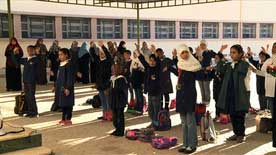
NATO shares, “It might sound strange, but there has not been a lot to do as a kid living in Tripoli for the last few months. The violence that engulfed the streets meant children were kept indoors for their own safety. Even when the capital is safe there is precious little in the way of cinemas, youth clubs or green spaces for sport. So now that schools are starting to open again, children are keen to return to the classroom”.
At Fayha school there’s an eagerness to see old friends and start doing things again. “We wanted to go to school and do some activities but the schools were shut,” says Hedaia aged thirteen. Bader in the year below agrees, “I get to study and revise at school, these are fun things, it has discipline. I like it better than staying at home.”
Reopening the school gates
Arriving early, the children say their prayers and sing the national anthem of Libya, before heading off for lessons.
Only about seventy students have turned up this morning out of the school’s usual roll call of four hundred, some parents are still too afraid to send their children to school. The children haven’t been able to attend school properly for over six months, and even now don’t officially have to be here, but they have come anyway.
The date for the official school period to start is still unclear; some predict it will be months from now, possibly in January. The school is operating without an official curriculum. “I wish that the changes in the curriculum would be fundamental so that it transforms the personality of the pupil,” the Headmistress Mofida says, “a complete shift from all sides, socially, morally, and educationally, because it is impossible for us to change without a change in what we are taught.”
Much of what Libyan pupils have been taught over the past forty years has to be re-examined. Required reading in schools during the Gaddafi era was his ‘Green Book’, which contained the former ruler’s thoughts on politics, economics and how to live your everyday life. It will take time to agree on an acceptable curriculum for the future.
Overcoming recent traumas
Going back to school is a welcome escape from the recent traumas that Libya’s children have lived through. It is crucial that a sense of normality should return after so many months of uncertainty and conflict. Although on a limited basis, these children can come here and continue learning on computers, and study subjects like maths, music and Art.
In one classroom an art lesson is underway, the children drawing quietly. “I feel that they are getting into the art and drawing with enthusiasm and no restrictions on them,” says Nadia their teacher. “Even the ones who have the old mentality and whose parents are still sympathetic to the old regime, they can express whatever they choose to.”
The number of students coming back is increasing, however a recent skirmish close by in the Abu Sleem area, known still to contain people loyal to Qadhafi, is reflected in the slightly lower attendance. Despite this, the feeling of freedom permeates every level of Libyan life and every generation.
“There was a feeling of fear when Qadhafi used to rule us but now it is total freedom,” says Salma, aged fourteen. “We can talk, we have the freedom of thought, not at all like it used to be. My feeling now is I am a free Libyan sitting in front of a camera and I am talking freely, I can say whatever I want without any of the red lines.”
